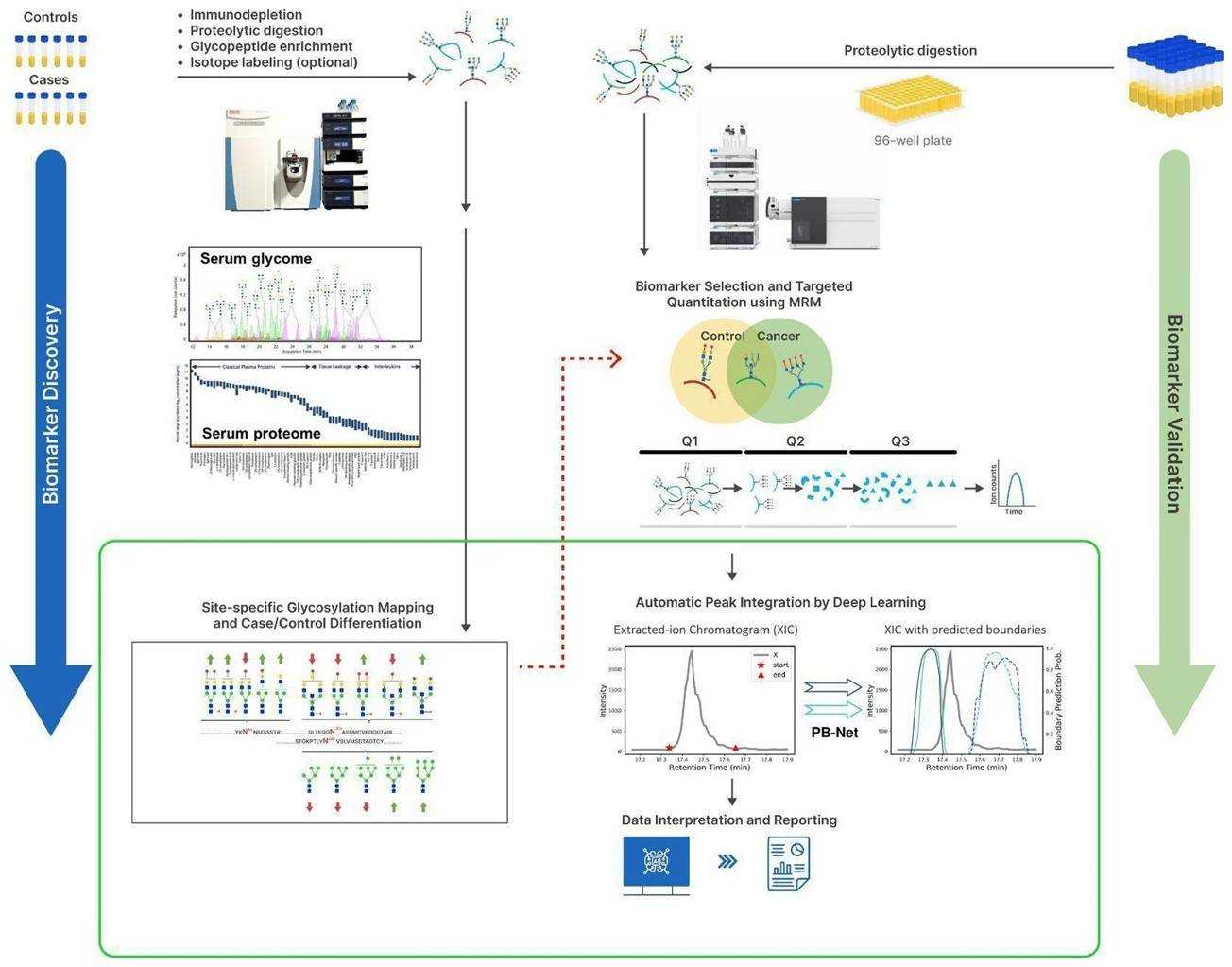Glycoprotein Biomarkers Research
As an outstanding biological company, Creative Biolabs has abundant experience, great technology platform, and professional teams in glycoprotein-related research and applications. We aim to provide the best and professional services to our customers all over the world. We have accumulated extensive experience in glycoprotein biomarkers identification and we are pleased to share our extensive experience with our customers to facilitate their related studies.
Background of Glycoproteins and Glycosylation
Glycoproteins are a group of proteins with oligosaccharide chains or glycans covalently attached to amino acid side-chains. These proteins are ubiquitously distributed and play an important role in various biological processes, such as cell signaling, cell-cell interaction, immune recognition, cell proliferation, and differentiation. Therefore, the alterations of glycoproteins possess a close relationship with the progression of diseases, such as autoimmune disease, Alzheimer’s disease, and cancer.
Protein glycosylation is the process the carbohydrate is attached to the protein in a cotranslational or posttranslational modification. Researches have indicated that most proteins in humans are in glycosylation form. These highly abundant glycoproteins are represented by many substances of biological importance, such as critical roles in human diseases by affecting the activities of enzymes, hormones, and antibodies. The aberrant glycosylation is associated with abnormal changes in biological activity, protein folding, and molecular recognition in disease. Therefore, analysis of altered disease-related glycoprotein expression or glycosylation will facilitate the discovery of glycoproteins biomarkers, which can be potential targets of therapeutics.
 Fig.1 Biomarker discovery process.1, 2
Fig.1 Biomarker discovery process.1, 2
Glycoproteins Biomarkers
Glycoproteins are different in levels, structures, and locations at different development stages of the disease. Glycoproteins also can be affected by environmental factors such as nutrition status and chemotherapy. Therefore, it is increasingly important that using glycoproteins as biomarkers for disease diagnosis, prognosis, and treatment monitoring.
Glycoprotein biomarkers are special proteins that can be used for early detection and monitoring the course of disease progression. Glycoprotein biomarkers may play a central role in accurate diagnosis and prognosis of diseases. Specific glycoforms of glycoproteins may serve as potential biomarkers for the early detection of disease or as biomarkers for the evaluation of therapeutic efficacy for treatment of cancer, diabetes, and other diseases.
Glycoprotein Biomarkers Research in Creative Biolabs
Glycoprotein biomarkers have already been applied in various disease investigations.Creative Biolabs has accumulated extensive experience in the discovery of glycoprotein biomarkers in many diseases, including but not limited to:
Cancer biomarkers are produced by a tumor or other cells in response to benign or malignant conditions. Glycosylation and related processes play important roles in cancer development, progression, and metastasis, including ovarian cancer, breast cancer, prostate cancer, etc. Several glycoprotein biomarkers, especially P-glycoprotein, have been identified to be closely associated with carcinogenesis and functional processes in the tumor.
An autoimmune disease is a chronic inflammatory disorder arising from a wide range of abnormalities of the immune system to a normal body part including kidney, heart, joints, brain, and skin, such as common rheumatoid arthritis, systemic lupus erythematosus, psoriasis, etc. The relevance of glycosylation in pathogen recognition, inflammation, innate immune responses, and the development of autoimmune diseases have been indicated and confirmed by many scientific studies. Recent studies have reported that over-expression or hyperfunction of P-glycoprotein is proposed to be the mechanism of drug resistance in patients with autoimmune disorders, and P-glycoprotein inhibitors could reduce P-glycoprotein expression in patients with autoimmune disease.
Neurodegenerative diseases are a heterogeneous group of disorders that are characterized by the progressive degeneration of the structure and function of the central nervous system or peripheral nervous system. It has been confirmed that aberrant protein glycosylations could result in human neurodegenerative diseases, such as Creutzfeldt-Jakob disease, Alzheimer’s disease, and Parkinson’s disease.
Technologies for Glycoprotein Biomarkers Research
Proteomics is the main means used in recent glycoprotein biomarkers researches. Combined with a variety of advancing technologies like gel electrophoresis, liquid chromatography, mass spectrometry (MS), glycoprotein biomarkers research have been radically improved in both the speed and precision of identification and measurement. As a comprehensive and leading biology company, Creative Biolabs possess abundant technology platforms for glycoprotein biomarkers research, as follows:
In terms of the extensive experience in glycoprotein biomarkers research, Creative Biolabs is proud to offer our clients a series of glycoprotein biomarkers identification and analysis services with the highest quality and at the most competitive price. Please contact us for more information and a detailed quote.
References
-
He, Kai, et al. "Decoding the glycoproteome: a new frontier for biomarker discovery in cancer." Journal of Hematology & Oncology 17.1 (2024): 12.
-
Under Open Access license CC BY 4.0, without modification.
For Research Use Only.
Resources

 Fig.1 Biomarker discovery process.1, 2
Fig.1 Biomarker discovery process.1, 2

